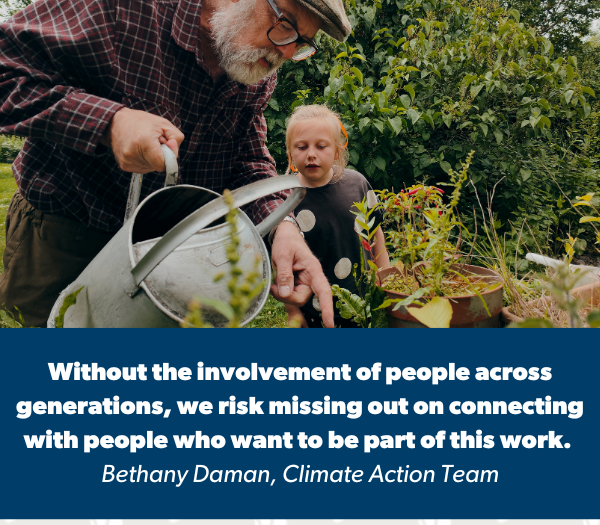Last year, on International Youth Day (August 12), the United Nations asserted that climate change demands intergenerational solidarity:
“Youth [are] on the frontline when it comes to facing the impacts of the climate change challenges in the long-term,” said Ovais Sarmad, Deputy Executive Secretary of UN Climate Change. “The young generation is a generation that has grown up with climate change and which is rightly demanding intergenerational solidarity and inclusion of their asks in policymaking.”
Young people have their whole lives ahead of them on a planet in crisis, and it is absolutely true that climate policy must center their needs, demands, and dreams.
However, young people aren’t the only ones in need of intergenerational solidarity, both now and in the future. Seniors, for example, are especially vulnerable to the cascading health and economic risks related to environmental crisis. Moreover, under interlocking systems of oppression such as colonialism, racism, ableism, and classism, people of all ages are at risk.
Effective intergenerational solidarity requires us to understand that the frontlines of climate change are expansive – and, as the crisis intensifies, that they’re also expanding. The scope of the problem can feel destabilizing, but it also presents a vital opportunity to build a bigger ‘we.’ If we all are affected by the climate crisis, then we all have a material interest in taking meaningful, sustained collective action.
To build a “we” that includes people of all ages, young people need to recognize that their needs, demands, and dreams are bound up with those of their elders, and vice versa. Fortunately, community economies provide a supportive site for nurturing such solidarity.
Consider Climate Action Team (CAT), a coalition of Manitoba-based organizations (several of them CCEDNet members). CAT has published Manitoba’s Road to Resilience, a series of reports that outline an achievable and concrete pathway to a climate resilient future, while considering human and economic impacts. Many CED principles and practices are foundational to the pathway, such as social procurement, a just transition for workers, and local food sovereignty, among others.
In order to push policymakers to implement the Road to Resilience plan, CAT launched Consider Climate, MB earlier this summer. This grassroots, non-partisan campaign is already generating significant traction, and according to CAT’s Bethany Daman, intergenerational solidarity is one of the keys to its early success.
Bethany says, “At our campaign launch this July, attendees ranged from elementary school age to seniors – all concerned about climate change. We had four speakers who shared why they believe climate action is so important: a youth, a soon-to-be parent, a grandparent, and a retired nurse. Each person’s story was able to connect and resonate with people differently, and the feedback we received about the intentional intergenerational involvement was that it really helped people feel connected. There was less ‘oh, this movement isn’t for me,’ but rather ‘I see that other people like me are involved, there must be a space for me too.’
Volunteer submissions have been coming in almost daily from people across generations who want to get involved in the Consider Climate campaign because they recognize that climate change is something that’s not only affecting them, but also something that’s affecting future generations they care about deeply. Grandparents are constantly sharing with us that they’re getting involved because they’re concerned about their grandchildren’s future.
We’re already seeing the impacts of this intergenerational involvement, the Consider Climate campaign is by-far the most impactful campaign we’ve ever worked on – and it’s only just begun.”
Read the full interview with Bethany below.






